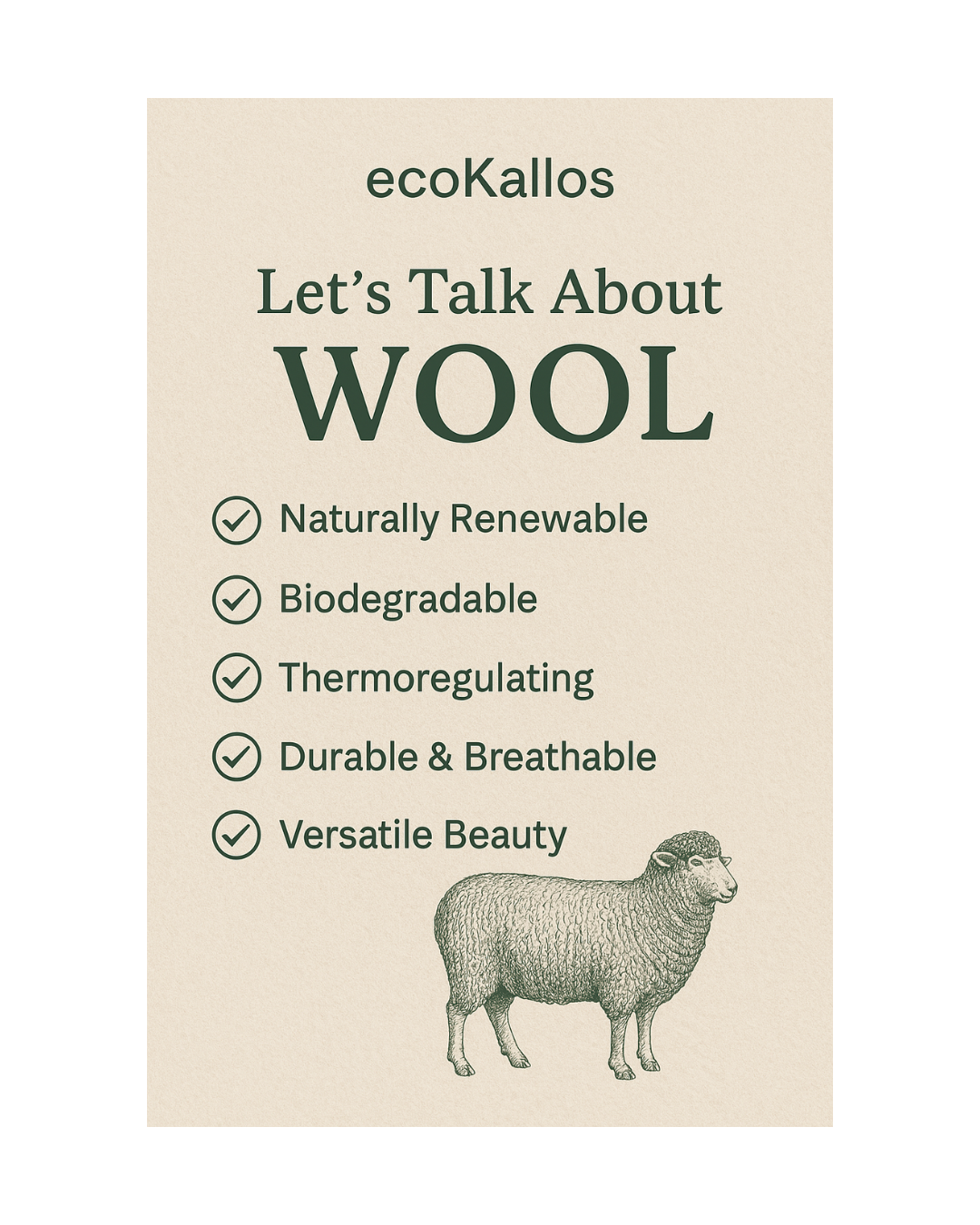Growing up, I would watch my grandmother—born and raised on a Greek island in the early 1900s—wear traditional wool undershirts all her life. Not just in the winter, but even during the hot summer months.
As a child, I couldn’t understand it. How could she wear wool in the summer? Wouldn’t she be sweating, too hot?
It took me years to realize that wool isn’t just a material for warmth—it’s naturally breathable, moisture-wicking, and temperature-regulating. What seemed odd to me then was simply wisdom passed down through generations.
My grandmother belonged to the last generation on the island whose clothing was made entirely from natural materials—designed not just for fashion, but for function. Their clothes helped them stay comfortable during everyday tasks, adapting to their environment.
So today, let’s explore what makes wool such an extraordinary material—and why it deserves a place in our conscious wardrobes.
Wool is more than just a cozy winter staple — it’s a powerhouse natural material that’s been keeping humans warm, dry, and comfortable for thousands of years. In today’s world of conscious living, wool stands out for its biodegradability, renewability, and versatile beauty. In this post, we dive deep into the world of wool: how it’s made, what types exist, the benefits it offers, and how to choose it responsibly.
What Is Wool?
Wool is a natural protein fiber obtained primarily from the fleece of sheep, though other animals like alpacas, goats, and even camels also produce variations of wool. What makes wool special is its crimped, elastic texture, which allows it to trap air and provide superior insulation.
Historically, wool has been a cornerstone of clothing across civilizations. Its durability and adaptability made it a go-to fiber long before synthetics entered the scene.
Types of Wool
Not all wool is created equal. Here are some common types:
- Merino Wool: Ultra-soft, fine, and breathable; ideal for base layers and athletic wear.
- Shetland Wool: Coarser and more durable; great for outerwear and knitwear.
- Cashmere: Luxuriously soft and insulating; derived from cashmere goats.
- Alpaca: Silky and hypoallergenic; warmer and lighter than sheep wool.
- Mohair: From the Angora goat; smooth, shiny, and strong.
- Yak Wool: Warm, soft, and increasingly popular as a sustainable option.
Each type varies in softness, warmth, sustainability, and price, making it suitable for different uses.
How Wool Is Produced
The wool production process involves several steps:
- Shearing: Removing the fleece from the animal, typically once a year.
- Scouring: Cleaning the fleece to remove grease, dirt, and contaminants.
- Carding: Detangling and aligning fibers.
- Spinning: Turning the fibers into yarn.
- Finishing: Dyeing, weaving, or knitting into fabric.
Ethical wool production focuses on animal welfare, land stewardship, and fair labor practices.
Benefits of Wool
- Thermoregulating: Keeps you warm in winter and cool in summer.
- Biodegradable: Breaks down naturally in soil within a few months.
- Odor-resistant: Wool fibers repel bacteria and moisture.
- Durable: Maintains shape and appearance over time.
- Flame-resistant: Naturally flame-retardant without chemicals.
Ethical Concerns & Certifications
Conventional wool production can involve harmful practices such as mulesing. To ensure animal welfare and sustainability, look for:
- Responsible Wool Standard (RWS)
- ZQ Merino
- GOTS (for wool blended with organic fibers)
These certifications prioritize animal welfare, environmental care, and ethical labor.
Caring for Wool
- Washing: Hand-wash or machine-wash on a gentle cycle with cold water.
- Drying: Lay flat to dry; avoid wringing or hanging.
- Storage: Store clean wool items in breathable containers with lavender or cedar to deter moths.
References & Further Reading
The Woolmark Company
The Woolmark Company is the global authority on Merino wool, providing information on wool’s benefits, care, and innovations.
🔗 https://www.woolmark.com
Responsible Wool Standard (RWS) – Textile ExchangeThe RWS ensures the welfare of sheep and the land they graze on, promoting best practices in wool production.
🔗 https://textileexchange.org/responsible-wool-standard/
ZQ Merino Wool
ZQ Merino offers ethically sourced wool, focusing on animal welfare, environmental sustainability, and quality.
🔗 https://www.discoverzq.com
International Wool Textile Organisation (IWTO)
IWTO represents the global wool industry, providing resources on wool standards, sustainability, and market information.
🔗 https://iwto.org
Sustainable Jungle
Sustainable Jungle shares ideas, tips, and stories about sustainable living, including insights into eco-friendly fashion and materials like wool.
🔗 https://www.sustainablejungle.com
